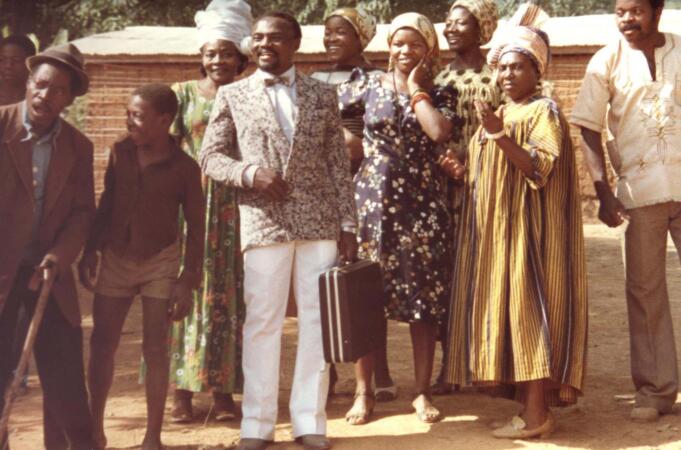
As was announced last week by the Academy of Motion Pictures Arts and Sciences, 9 features have advanced to the next round of voting in the Foreign Language Film category for the 89th Academy Awards. Eighty-five films had originally been considered in the category.
Of note, given this blog’s specific interests, among the nine shortlisted is “Tanna” – a story about star-crossed lovers in the South Pacific island nation of Vanuatu, co-directed by Australian filmmakers Bentley Dean and Martin Butler (their narrative feature debut) – which is representing Australia in the 2017 Foreign Language Film Oscar race. Now we wait to see if it makes the final list when the 5 nominations for the 89th Oscars are announced on Tuesday, January 24, 2017.
Four of the original 85 films that were initially considered came from African countries: Algeria, Egypt, Morocco and South Africa. Unfortunately none of their submissions made the list of 9 semifinalists that have advanced to the next round of voting in the category.
These 4 countries – especially the first 3 – have long cinema histories, and have submitted films for Academy Awards consideration numerous times, going back as far as the 1960s. This realization prompted me to take a look at Africa’s contributions to that specific Oscar category – the Foreign Language Film – since it was first introduced in 1956 (the 29th Academy Awards which were handed out in 1957), when a competitive Academy Award of Merit, known as the Best Foreign Language Film Award, was created for non-English speaking films and has been given annually since then.
Prior to 1956, the Academy presented Special/Honorary Awards to the best foreign language films released in the United States; however, they weren’t handed out regularly, and it wasn’t competitive unlike other categories. Although in the very early years of the ceremony, probably until after WWII, there was really no separate recognition for foreign language films.
And the film that would win the first official Best Foreign Language Oscar was Federico Fellini’s “La Strada,” beginning a trend that would go on to see European films dominate in terms of wins in that category, followed by Asian films, with African films, and films from Latin America, rounding out the list.
I won’t tell you exactly how many African film submissions that have won the Best Foreign Language category, but as I’m sure you can guess, the number is very low.
This post continues a series that will look at each African country (I can tell you that there won’t be that many countries) that has not only submitted films for nomination consideration, but have also seen their submissions make the final cut and be nominated; a series that will be done in alphabetical order, starting 2 days ago with Algeria (read that post here if you missed it), continuing yesterday with Burkina Faso (read that here).
Continuing with the list of countries in alphabetical order, based on my research, I had to skip over Burundi to get to today’s country, which is Cameroon. Why did I skip Burundi? Well, simple. The country has never submitted a film for Oscar consideration.
Cameroon, on the other hand, has submitted just one film for consideration in the entire history of the Academy Award for Best Foreign Language Film: In 1981, “Notre fille” (“Our Daughter”) by Daniel Kamwa, considered to be one of the fathers of Cameroonian cinema.
While researching to verify, I stumbled upon an October article on the Times of India website which states that “Yahan Ameena Bikti Hai,” a 2016 Indian film directed by Kumar Raj, was submitted as Cameroon’s entry for Best Foreign Language Film Oscar consideration this year. Digging further, the reason given for why an Indian film would be an African country’s submission is that a Cameroon-based production company called MD4 Productions played a “small role” in the making of the film, which was apparently partly filmed in Cameroon, but is still very much an Indian production, telling a story centered around the lives of Indian people, with an Indian filmmaker, writer, production team etc. MD4 likely helped facilitate the part of the film that was filmed in Cameroon – securing locations, local actors for background detail, etc.

I couldn’t find any other reputable announcement of the film being submitted as representation for Cameroon; in fact, the Times of India report had a key error in it that made me suspicious of its content. Thankfully the Academy releases a list of all the countries that submitted films for Foreign Language Film consideration this year (as it does every year), and Cameroon isn’t listed. The film isn’t listed either; India did submit a film but it’s not “Yahan Ameena Bikti Hai.” So I have to go with the Academy’s official list and say that Cameroon didn’t submit an Indian film for Foreign Language Film consideration this year; and the country’s total entries in the history of the Oscars, is still one: the aforementioned 1981 film “Notre fille” (“Our Daughter”) by Daniel Kamwa.
Unfortunately, unlike the previous two films in this series (from Algeria and Burkina Faso) this is one that I’ve actually never seen. Good luck finding it for sale or rent anywhere. I couldn’t even find it on Ebay, which is often a last resort for me when looking for media that’s no longer in circulation – seemingly so anyway.
I did learn that a few universities here in the USA and Europe have the film in some format – on DVD and VHS. So it’s *out there* but it’s not a film you can readily buy or rent. It’s not even clear that it was ever released in the USA; its IMDB page says it screened at a couple of film festivals, in Russia (the Soviet Union at the time; specifically in Moscow) and France.
So there isn’t a lot I can say about it, but I’ve made a few connections and hope that I’ll eventually get my hands on a copy of the film, and then I’ll return for a more thorough read of it, after I’ve screened it.
What I can tell you is what the film is about. Here’s the synopsis, itself also difficult to find: Papa Mbarga, head of a big family and chief of a village, is getting ready to pay a visit to his daughter, Charlotte Mbarga who works in a big Ministry in Yaoundé. He’s determined to prevent his daughter from getting married, in order to support her parents and her little brothers and sisters as African traditions demand.
It’s described as a dramedy, which is said to be director Daniel Kamwa’s primary milieu – comedies that address socioeconomic and cultural concerns. In this case, we could say it’s the common “tradition versus modernity” theme that we continue to see in African cinema. The daughter has obviously left home (the village) and all of that tradition behind, to move to the big city, where she’s a professional, with plans to start her own family. But the father wants her to give all that up, and instead return to the village and adhere to traditional customs.
Needless to say, that’s likely where the conflict lies – the push and pull between father and daughter.
“Notre Fille” stars Stanislas Awona, Elise Atangana, Nicole Okala, Berthe Mbia, and the director, Daniel Kamwa, who did do some other acting as well.
I learned that the film was adapted from a radio play by Guillaume Oyono-Mbia, was shot on 35mm film, and was submitted for Academy consideration in 1981; but it didn’t make the short list of nominees that year. And it would represent the only time in Cameroonian cinema history (a rather short one, with good reason), that the country has submitted a film for Best Foreign Language Film consideration.
Kamwa’s feature film debut, 1975’s “Pousse-pousse,” is one of the earliest full-length films from Cameroon to be recognized internationally.
Unfortunately, you’ll have a hard time finding any of his work; they’re just not accessible, so don’t expect to find them on Netflix, Amazon.com, etc. You’d have better luck on the college/university circuit.
But I’ll return with a much more thorough write-up about Kamwa and his films in a future post, once I’ve done a lot more research. The 73-year-old director is still very much alive and still making films. This year, he actually premiered an animated feature film titled “Turbulence” that he co-directed with South Africa-based visual effects director and 3D technician, Pierre-Paul Nyobé. The film was an official selection at the Durban International Film Festival over the summer. I’ll profile that film in a later post.
I was very surprised to actually find the below clip from “Notre Fille” on YouTube:
